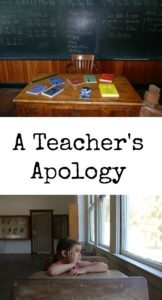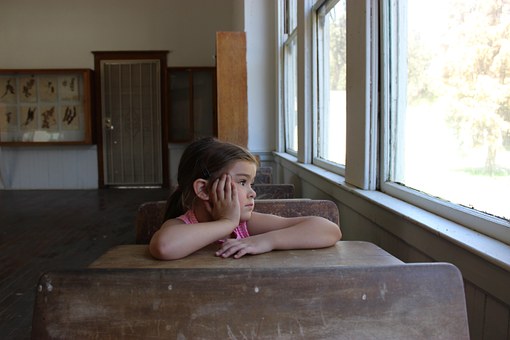A Teacher’s Apology

An ordinary school day
An apology was the last thing from my mind that day. Yet it is something I have never forgotten. When school work was caught up, we were allowed to read or find another way to entertain ourselves. My classroom was one of four in the school. Our classroom housed about twenty-five students, grades four through six.
As was our practice, if something struck us as being funny, we’d push our chairs back and peer into our desks, trying to stifle our laughter. Rearranging one’s desk was a quick cure for laughter that threatened to spill out into the silent air. Plus, looking into a messy desk kept one from looking at the other students who were also laughing, which would only heighten the problem.
Our teachers knew that our laughter was normally not from naughtiness and, on usual school days, a little laughter in fun was okay. Students also liked to hide what they were reading by using a textbook as a cover. That was easier to do if a child put the opened textbook on his lap, put a smaller library book on top, scooted his chair back just far enough that he could put his forehead on his desk, and read to his heart’s content. The teacher walking by noticed only the textbook on the lap and assumed her student was studious.
I was guilty of doing that a few times, but most times, my schoolwork was done when I chose a library book for entertainment. Once my work was done, I’d pull out my latest reading material and block out the sounds of shuffling feet, erasers over pencil marks, and quiet whispers of a teacher helping a student.

The unordinary
On this particular day, our teacher’s countenance was more dour than normal. We sensed her mood but there seemed to be no explanation for it. Certainly, I didn’t think we were the problem, for no behavior problems surfaced during the day of which I was aware. It’s possible she wasn’t feeling well herself; but whatever the reason, it was not apparent to the rest of us.
Putting my head on my desk and placing my book on my lap, I started reading. Page after page turned under my hands and I was oblivious to what was taking place in the room. Yet, even when a student feels oblivious, he still has a sense of what is happening.
That day was no different than others. I vaguely remember stifled laughter of other students, but I was so engrossed in my book that I just kept on reading. Suddenly, the teacher spoke, reprimanding other students sitting near me. Apparently, their laughter made her feel that they were laughing at her. She scolded them, and they maintained their innocence.
Her voice penetrated through the words on my library book page.
“Then tell me why,” she demanded sharply, “is Gertrude sitting there with her head down?”
I lifted my head slowly, blinking my eyes at the brightness of the room.
“I’m reading,” I answered her truthfully.
Total silence reigned. The teacher dismissed the subject and class continued.
The apology
A few days later during a class discussion, my teacher spoke to all of us about her actions on that day.
“I need to apologize to you all,” she said, “and especially,” her eyes caught mine, “to you, Gertrude. I judged you harshly without getting my facts straight first. Will you forgive me?”
My respect for this teacher soared, and all was forgiven.
The apology eased the conscience of the teacher. More importantly, it modeled for me and for the entire classroom what it means to be authentic and real.

This is a repost from seven years ago.







